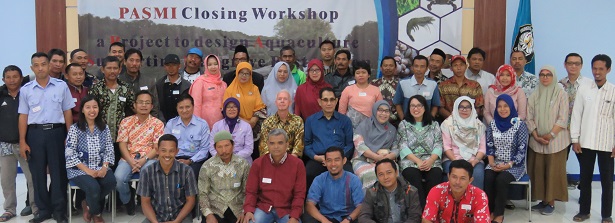AQUACULTURE, SEMARANG – In many tropical countries, clearance of mangrove ecosystems for coastal development results in decreased seafood from fisheries, abrasion of land, losses of prospering rural livelihoods, and reduced sedimentation required to counteract land subsidence and sea level rise. Current development programs in Indonesia envision a future in which mangroves underpin coastal protection and resilient livelihoods, and both aquaculture and fisheries provide healthy foods for rural and urban populations. Many locations along the coast of North Java, Indonesia, suffer from mangrove loss and land subsidence due to urbanization.
Within this frame, the PASMI project will enhance sustainable rural-urban food systems by designing, together with the main stakeholders, environmentally friendly alternatives for extensive shrimp culture, which often goes at the expense of mangrove areas. PASMI will specifically support and analyse the introduction of blue swimming crab farming and integrated aquaculture of shrimp, fish, seaweed and green mussel in Demak and Brebes, North Java, Indonesia.
The research focuses on multi-trophic coastal aquaculture systems, which support the restoration of mangrove forests in Indonesia. In these systems, different organisms, such as shrimp, blue crab and others, are produced in an integrated way, thereby supporting resilient livelihoods while also safeguarding the mangrove functions for coastal protection.
After PASMI’s kick-off in the beginning of March the project activities gradually started. The Junior researcher working on the crab will do her PhD at Wageningen UR. The Junior researcher working on the shrimp production systems will do so at UNDIP. To enable the take-up of the results from the research the UNDIP team, with support from Wageningen UR implemented a RAAIS (Rapid Appraisal of Agricultural Innovation Systems) for both sectors. PASMI aims to scale-out the technologies through the network of farmers related to the project Building-with-Nature, Demak-Indonesia.

Lokakarya pemangku kepentingan terakhir proyek PASMI
The workshop was attended by more than 20 farmers, three representatives from the provincial “Kementerian Kelautan dan Perikanan” (KKP, Ministry of Marine Affairs and Fisheries), two from Balai Besar Perikanan Budidaya Air Payau – Jepara (BBPBAP, Government research center for marine aquaculture), four from feed and processing industry, four from BwN partners and several lecturers.
The PASMI closing workshop aimed at hearing the feedback of its stakeholders. Major activities of the workshop included a debate on the results presented by three researchers, a review of the manuals for Integrated Multi-Trophic Aquaculture (IMTA) and Bleu Swimming Crab farming, and an inventory of further challenges and actions. The PASMI project coordinators presented their results of monitoring the field schools implemented by BwN.
All participants highly appreciated the results of the experiments and tests on IMTA, which provides the byproducts, including waste, from one aquatic species as inputs (fertilizers, food) for another. Six farmers who practiced IMTA during one season gave positive feedback. Thus, the tested technologies can be spread further through farmer platforms, as a post field school activity with support of UNDIP staff. Although some farmers already started stocking Blue Swimming crab from by-catch in extensively managed ponds, the use of feed to sustainably fatten this crab is still quite challenging. The partners from BwN and industry appreciated the inventory of constraints to innovation, confirming that these are mainly lodged in conflicting government’s rules, regulations and implementations.
Project information PASMI | |||
Status | : | Completed |
|
Start Project | : | Apr 1, 2016 |
|
End Project | : | Dec 1, 2019 |
|
Project leader: Aquaculture & Fisheries group, Dep. Animal Science, Wageningen University & Research, Netherlands, Dr. Roel H. BOSMA.
Research partner: Aquaculture Dep., Faculty of Fisheries and Marine Science, Diponegoro University, Semarang, Indonesia. Local coordinator Dr Sri REJEKI.
Partners: Building with Nature Indonesia, Wetlands International Indonesia and Ecoshape-Netherlands.


Recent Comments